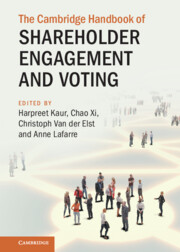Book contents
- The Cambridge Handbook of Shareholder Engagement and Voting
- The Cambridge Handbook of Shareholder Engagement and Voting
- Copyright page
- Contents
- Figures
- Tables
- Contributors
- Preface
- In Memoriam
- Abbreviations
- Introduction
- Part I Asia
- Part II Australia and North America
- Part III Europe
- 13 Shareholder Democracy in Denmark: Contrasting Law on the Books and Law in Practice
- 14 Shareholder Engagement and Voting in France
- 15 Shareholder Engagement in Germany
- 16 Shareholder Engagement and Voting in Greece
- 17 Shareholder Engagement and Voting in Italy
- 18 Shareholder Voting and Engagement in Norway
- 19 Shareholder Voting and Engagement in the Netherlands: The Dutch Institutional Approach
- 20 Shareholder Engagement and Voting in the United Kingdom
- Part IV Comparative Perspectives
- Index
15 - Shareholder Engagement in Germany
from Part III - Europe
Published online by Cambridge University Press: 10 September 2022
- The Cambridge Handbook of Shareholder Engagement and Voting
- The Cambridge Handbook of Shareholder Engagement and Voting
- Copyright page
- Contents
- Figures
- Tables
- Contributors
- Preface
- In Memoriam
- Abbreviations
- Introduction
- Part I Asia
- Part II Australia and North America
- Part III Europe
- 13 Shareholder Democracy in Denmark: Contrasting Law on the Books and Law in Practice
- 14 Shareholder Engagement and Voting in France
- 15 Shareholder Engagement in Germany
- 16 Shareholder Engagement and Voting in Greece
- 17 Shareholder Engagement and Voting in Italy
- 18 Shareholder Voting and Engagement in Norway
- 19 Shareholder Voting and Engagement in the Netherlands: The Dutch Institutional Approach
- 20 Shareholder Engagement and Voting in the United Kingdom
- Part IV Comparative Perspectives
- Index
Summary
In our paper, we survey the corporate landscape regarding shareholder engagement in Germany. We identify two main factors that constrain the possibilities of shareholders to engage in their company’s business decisions. The first factor concerns the legal design of the Aktiengesellschaft (AG) and in particular its two-tier board structure. A second factor concerns restrictions of shareholders’ involvement in the management of companies, especially when employees have a say in business affairs, due to the German co-determination rules. Empirically, shareholder opposition against management decisions plays a traditionally minor role. However, recent events like the dismissal of the managements’ discharge by the shareholders of Bayer in 2019 raise the question whether a new period of ‘shareholder activism’ is just about to begin. Recent developments rooting in the COVID-19-pandemic may well contribute to that transformation.
- Type
- Chapter
- Information
- The Cambridge Handbook of Shareholder Engagement and Voting , pp. 308 - 329Publisher: Cambridge University PressPrint publication year: 2022

